Dame Judith Olivia Dench CH, DBE, FRSA is an English actress. Considered by many to be one of the best actresses in British history, she has been named Britain’s best actor on multiple occasions. Her roles range from James Bond films to Shakespearean dramas and in the episode of Who Do You Think You Are? to be broadcast on BBC One on Tuesday 19 October 2021 she discovers that her Irish cousins have found a review of her very first professional performance in Hamlet in 1957. Dame Judi tells how her parents were both incredibly full of life with lots of visits to theatre as a child. An interesting fact comes out at the start of the programme where she reveals that her father could recite the whole of Hiawatha. She grew up in York in a family that would take their daughter, age 7 or 8, to see Macbeth in which her elder brother, Peter, was playing Duncan. Judi recalls how shaken she was when she thought that the line he delivered, “What bloody man is this?” was swearing.
It would be another Shakespearean play, this time in 1957, that would see Judi making her professional debut as Ophelia in Hamlet and she admits to being passionate about Shakespeare throughout her life. As the family history research in the TV programme will reveal, there is a strong link from one of her ancestors to the actual castle in Denmark which The Bard used as the backdrop for his play, Hamlet. The very play that launched her professional acting career.
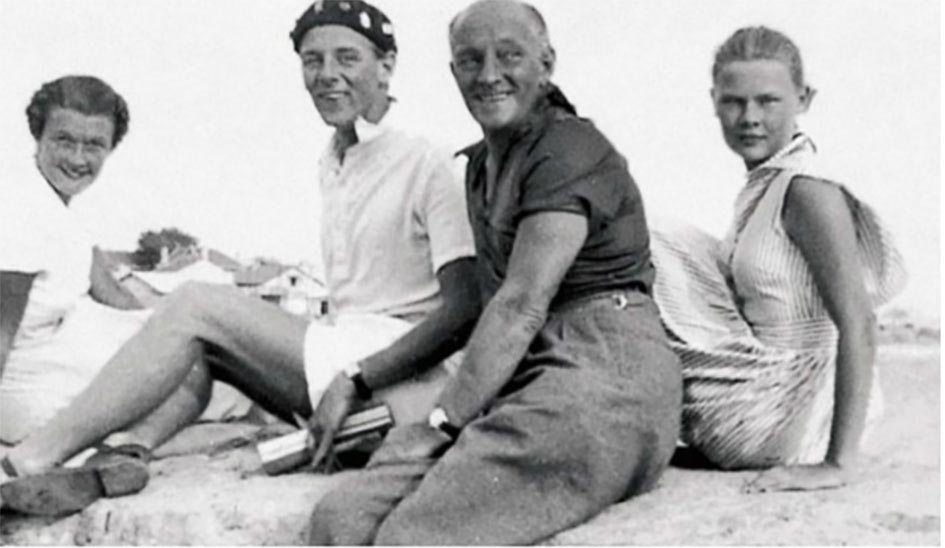
Judi was born in York on the 9th December 1934 to parents who had met and grown up in Ireland. Her mother was Irish but had no relations that she ever remembers. Her father, having been born in England, grew up in Dublin and became a Doctor. Reginald Dench was in the 1914-18 war as a very young man in the Leinsters, an Irish Regiment.
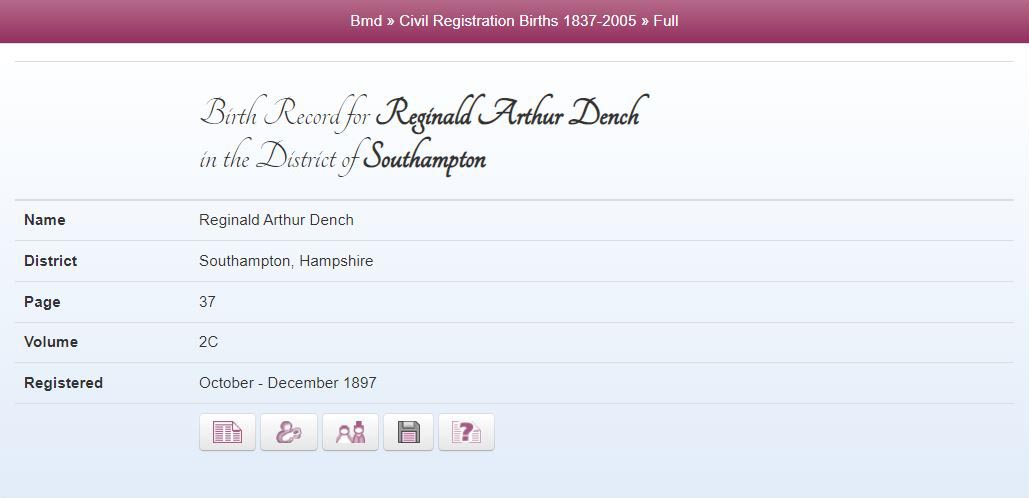
In the 1939 Register we can find Dr Reginald A Dench and his family recorded at Heworth Green in York.
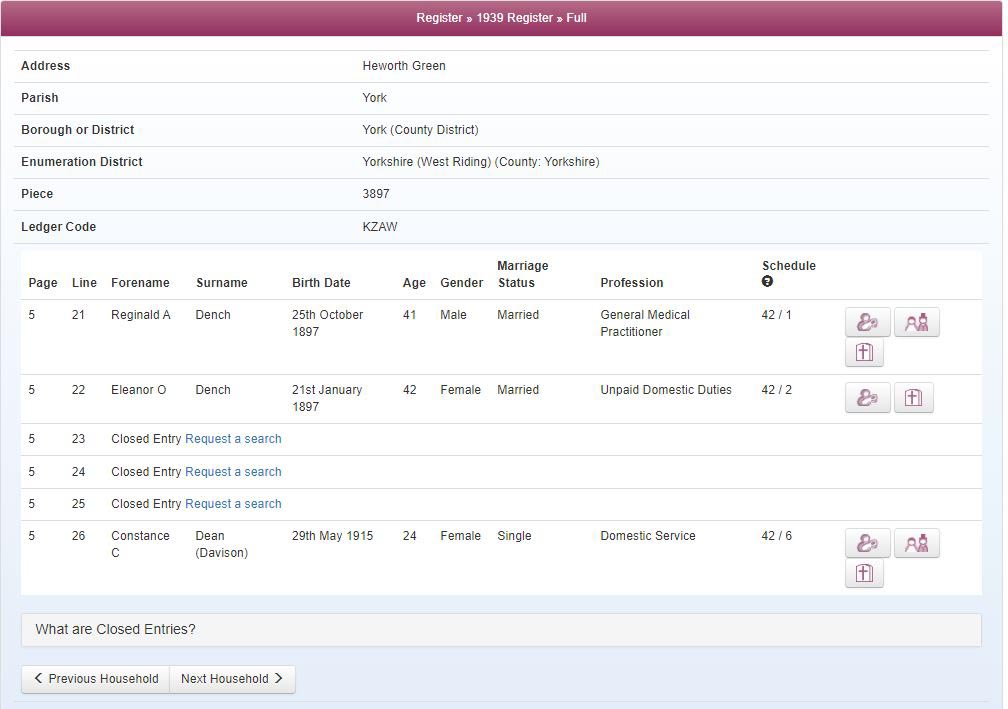
In the census collection on TheGenealogist we are able to find the young Reginald A Dench in Southampton in 1901, his father having been born in Weymouth, Dorset. The family then moved to Ireland where they set up in Dublin. Judi’s grandfather was an Insurance Manager by this time and we can find him in the Kelly’s Directory of Ireland 1905 by searching TheGenealogist’s Trades, Residential and Telephone Directories.
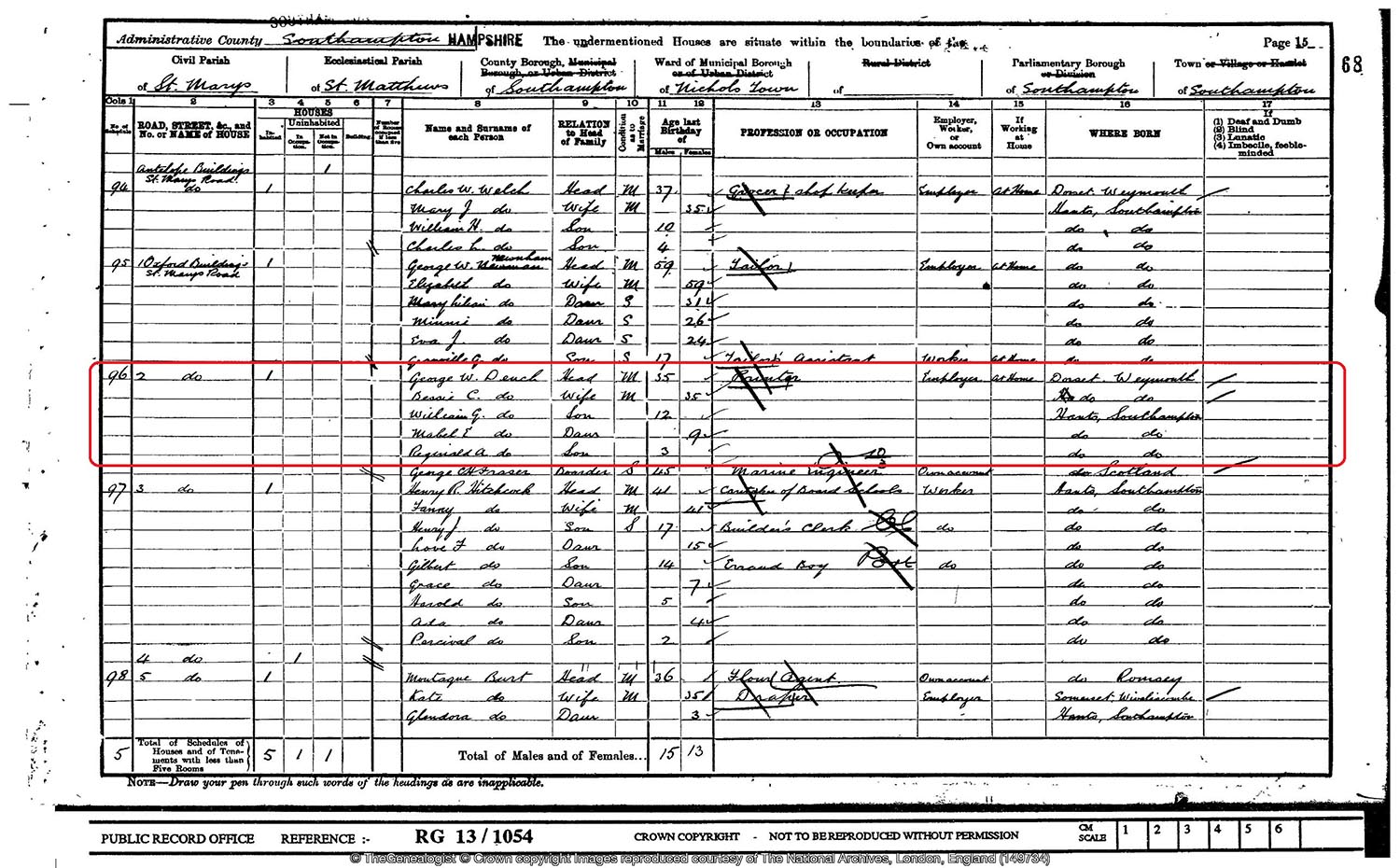
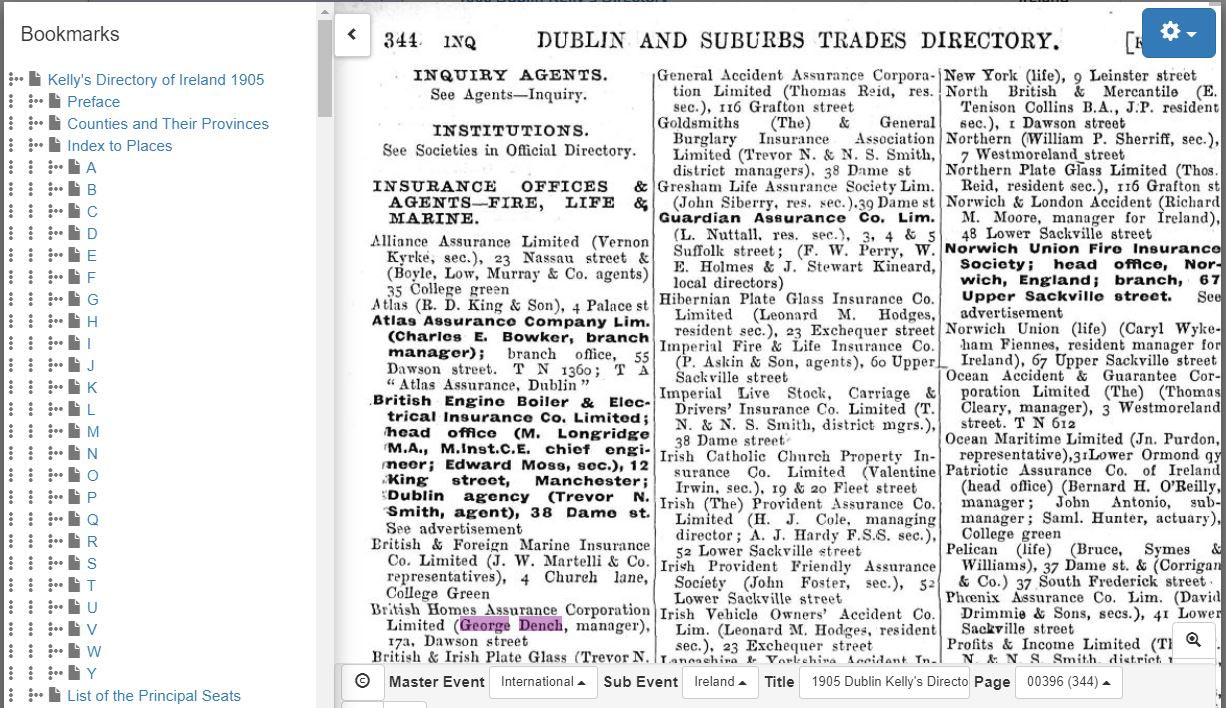
Judi pays a visit to Dublin to see her paternal cousins Denis and Valerie and talk about their grandfather and grandmother Bessie Oak Dench. They look at a picture of Reginald looking jaunty and recall how Judi’s father had won the Military Cross in the First World War having joined the Leinsters Regiment and so Judi pays a visit to the Military Archives of Ireland where she is able to take her research further with Lar Joye Military historian. He explains that Reginald was only 18 years old when he joined the British Army and was told to report to Trinity College Dublin OTC. The thought of a man at such a young age being trained to lead men older than himself is considered by Judi who realises that her father was younger than her own grandson’s age today when he went into war. From the military records she learns that the knee injury that she had always been aware that he got during his time in the army was from a training accident in June 1916 before he went to the front.
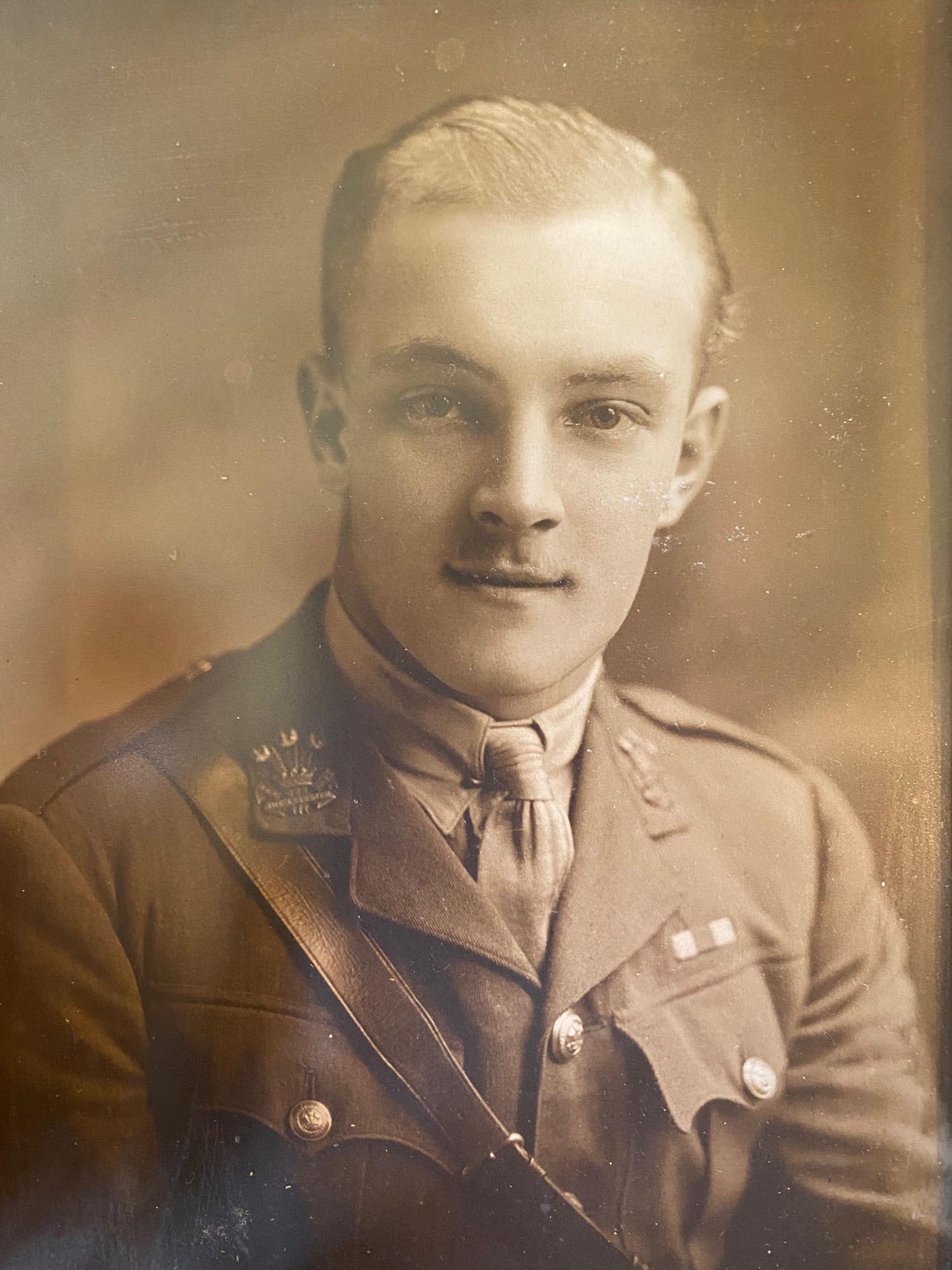
Judi shows the expert her father’s medals and he points out that the Military Cross has a Bar on the ribbon. Lar Joye tells her that only 300 out of an army of 6.5 million soldiers got the medal twice, as is the case with her father. Judi wants to explore why Reginald Dench was awarded MC and Bar so to do this she goes to consult with the battlefield historian Peter Barton. Peter explains that Reginald Dench was recovering from a knee operation at the time of the Somme offensive. This probably saved him from being killed like so many others were in the Battle of the Somme between 1 July and 18 November 1916. Second Lt Dench can be found in the Army Lists for 1916 on TheGenealogist. He is recorded in the 3rd Battalion of The Prince of Wales Leinster Regiment
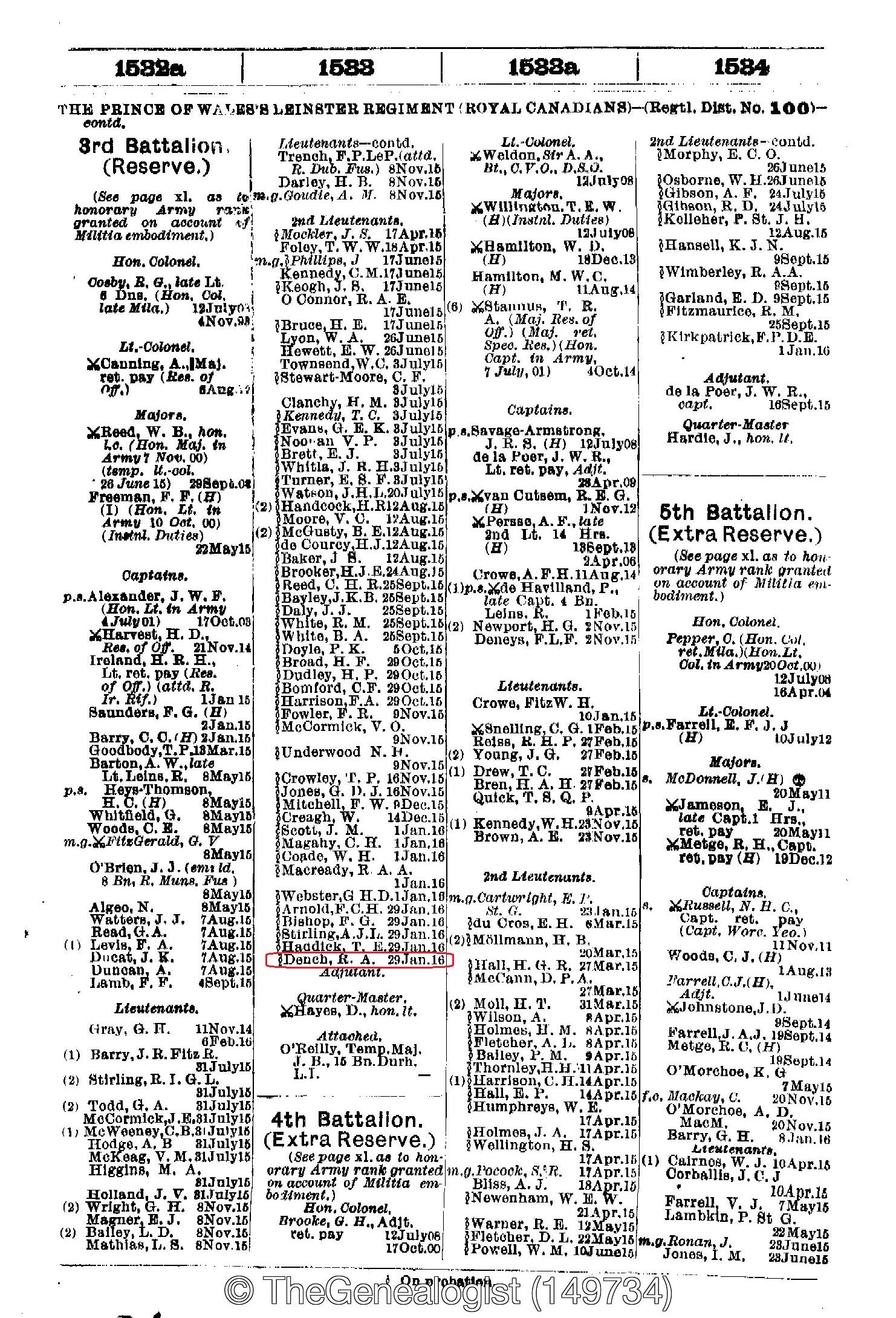
On the 8th March 1917 at Ypres, however, Judi’s father was to experience heavy shelling that started at.4 am when the Germans began a raid in an attempt to get into the British trenches. It was, however, a failure because the enemy artillery had not cut the barbed wire. The German soldiers attacked and then retreated and Reginald Dench picked up a machine gun and fired at the Germans as they went in both directions. The war diaries actually mention 2nd Lt Dench and another officer for especially distinguishing themselves while mentioning how all ranks had fought gallantly. Judi’s father was awarded his first MC for holding the men together in this action.
Access Over a Billion Records
Try a four-month Diamond subscription and we’ll apply a lifetime discount making it just £44.95 (standard price £64.95). You’ll gain access to all of our exclusive record collections and unique search tools (Along with Censuses, BMDs, Wills and more), providing you with the best resources online to discover your family history story.
We’ll also give you a free 12-month subscription to Discover Your Ancestors online magazine (worth £24.99), so you can read more great Family History research articles like this!
Six months later, on the 14th October 1917, Reginald was stationed south of Arras near the Hindenburg line, he was now an Acting Captain commanding 200 men. Captain Dench, the battlefield historian tells Judi, was to lead a raiding party in support of Royal Engineers who were sent to measure the enemy trench. While carrying out the survey Judi’s father was forced to shoot a German at point-blank. He also threw bombs and stayed in no-mans-land to shepherd his men back to the British trenches. For his heroism, he was awarded his second MC after this. Judi is not surprised at all that nobody spoke about it all.
Five months later on 21 March 1918 the enemy launched one of their most deadly assaults of WWI, the Spring offensive; his battalion lost every single officer. All were wounded or captured, but Reginald had been sent home because of his knee six days before. Judi recalls how her father would rub his knee, but never talk about it now it emerges that his injury had saved him a second time from a battle that killed so many. We can find Reginald’s Medal Card in the Military Records on TheGenealogist.
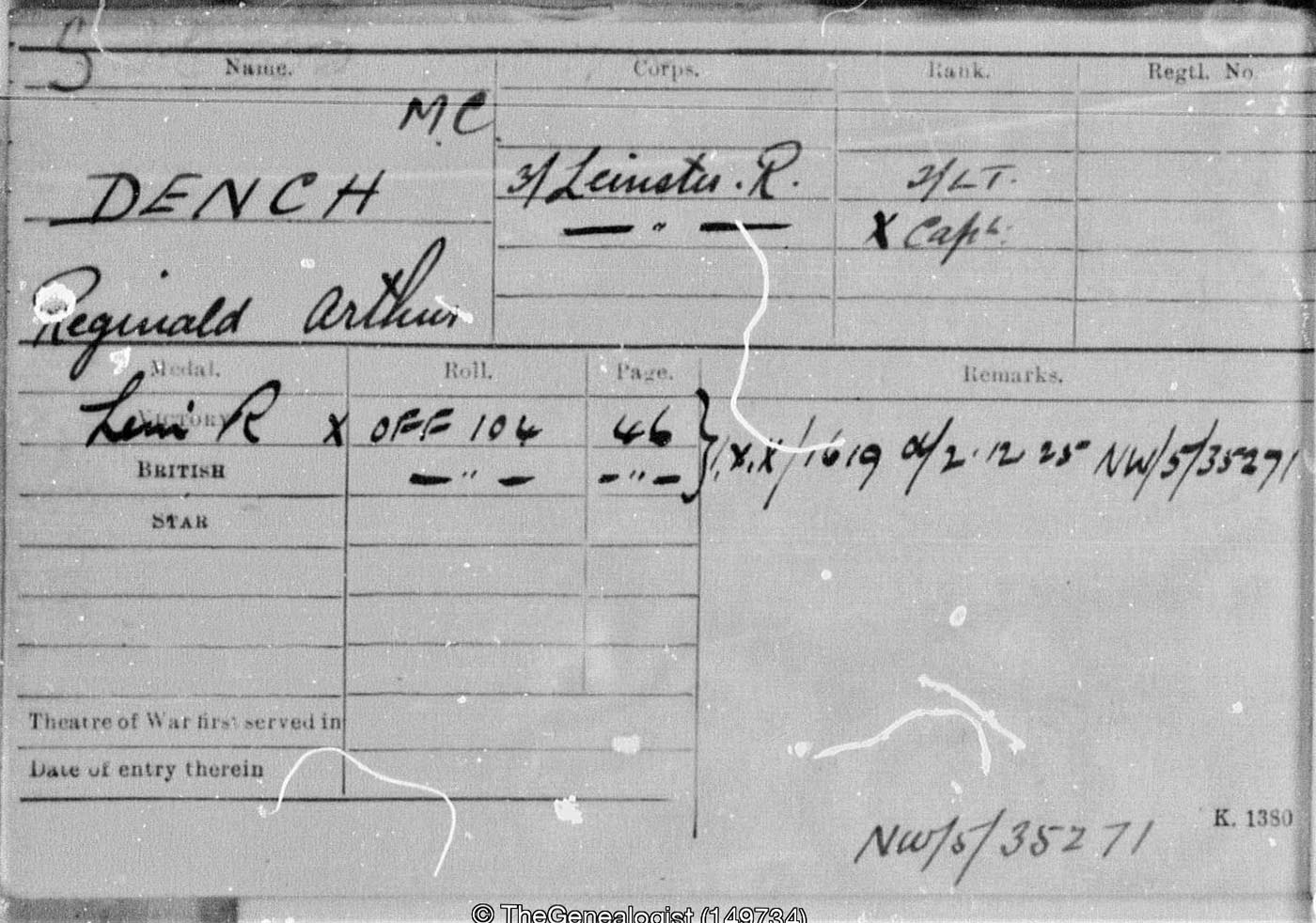
Judi goes to the church in Sandymount where a plaque in honour of those members of its congregation that served is on the wall next to the stained glass window in memory of her grandmother, Bessie Oak Dench.
Judi’s Maternal line
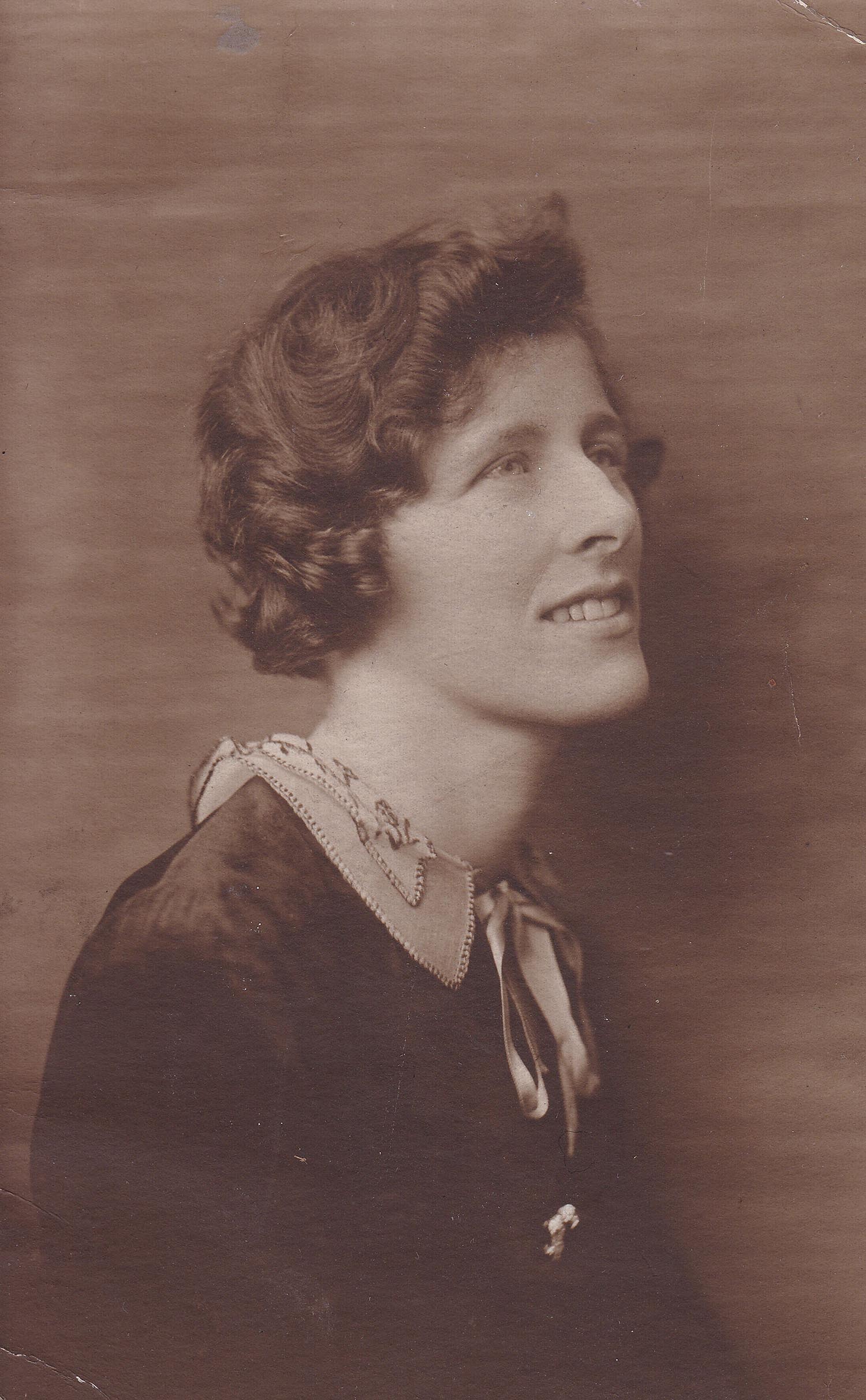
Judi next wants to explore her mother’s line and so to find out more about Eleanor Olive Jones, who was born in 1897 in Dublin, Ireland she meets Nicola Morris, a genealogist, at the National Library of Ireland. Eleanora is the daughter of Harry Jones or more properly Henry Jebb Jones. And his father is also called Henry Jebb Jones who married Margaret Wilson. Nicola, the genealogist, traces up Judi’s maternal line to Judi’s 2 x grandmother whose name was Eleanor Frances Bolton. This lady, who was born in 1802 is the daughter of Edward Bolton of Brazil House (1756-1809) and Francis Neynoe (1758-1850). They had been landed-gentry and lived in a large house which Nicola is able to provide Judi with a picture of. Though the image shows Brazil House as a ruin, she tells Judi that her ancestors, the Boltons, had been living there for at least 200 years.
From a search of the Peerage, Gentry & Royalty records on TheGenealogist we can discover that the Boltons became Solicitors-General in Ireland in 1618 and 1622. We are also able to find a mention in the Alumni Dublinenses 1593-1846 from TheGenealogist’s Educational Records as well as several of the Bolton family in the Index to Prerogative Wills of Ireland.
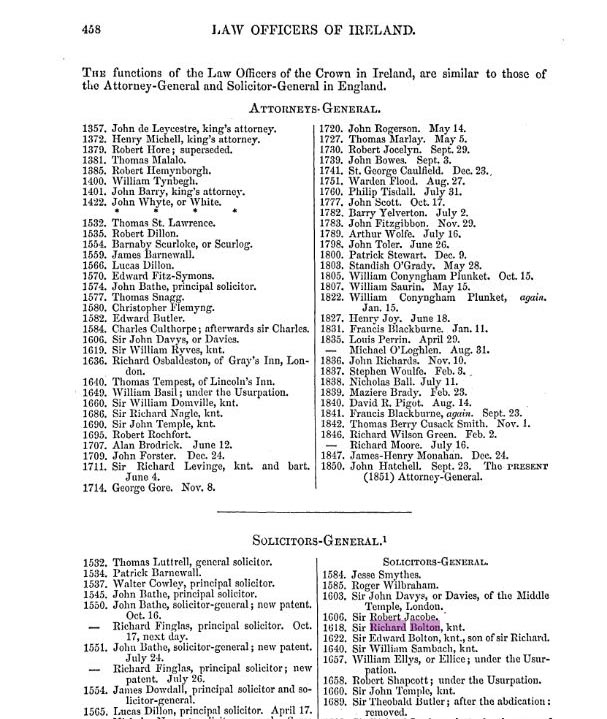
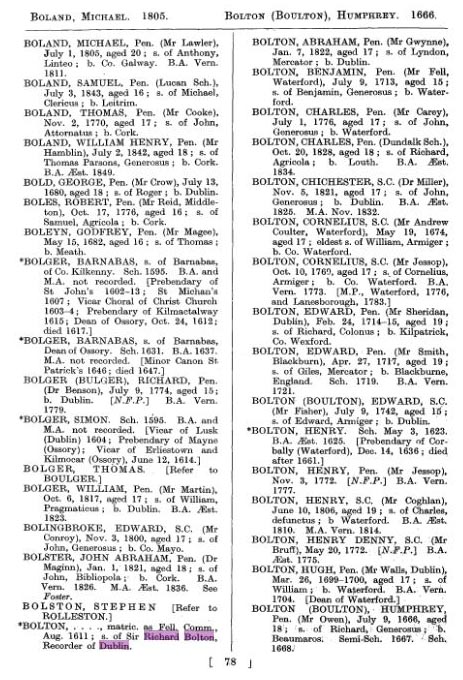
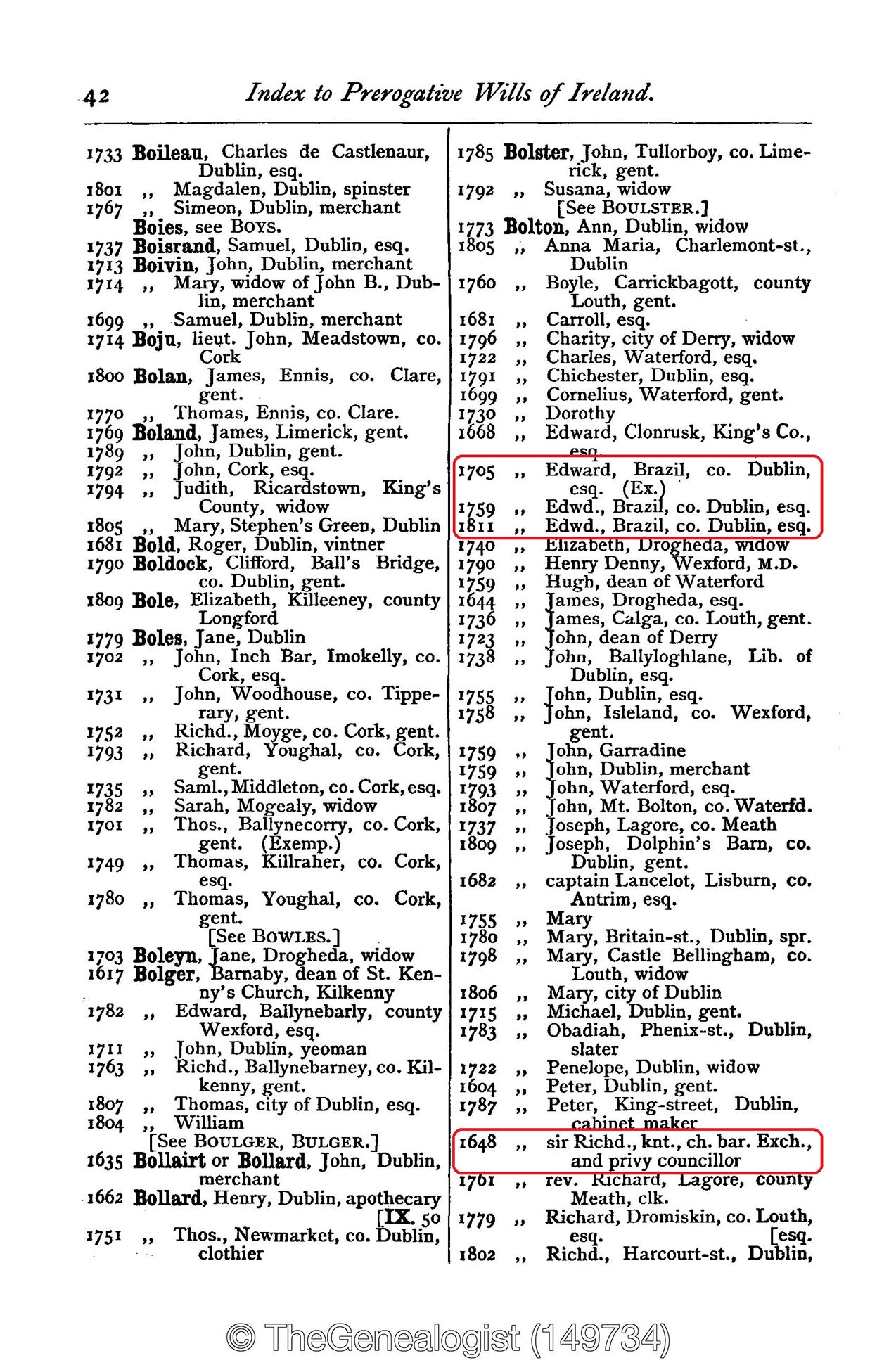
Judi is shown a handwritten book created by the office of the Ulster King of Arms, the Chief Herald of Ireland. From the details recorded in this Nicola is able to work all the way back to Judi’s 6x great grandfather, Richard Bolton, when he marries Anne Catherine the daughter of Steen Bille of Copenhagen (6x gr grandmother). Judi is surprised to find that she has Danish ancestors and is then told about how her ancestor, Richard Bolton, was taken to Denmark by an extraordinary evoy to Denmark, Robert Molesworth, who had taken the essentially orphaned Richard Bolton with him. His letters to his wife back in Dublin, he makes reference to the young man’s behaviour and his “mistress” Anne Catherine Steen. It would seem from the correspondence that Molesworth saw it as an inappropriate match!
To carry on the research Judi travels to Denmark where she is able to meet her distant relative, Joen Bille. Like Judi, he is an actor and in his excellent English he is able to explain more about their ancestors and to show her their ancestor’s diary from 1665. He is also able to let Judi see a picture of Anders Steensen who had been Counsel of the Realm, playmate of the King as well as to the King’s brother. Tragically he was forbidden to marry the mother of his children, Katrina, because she was not from a noble family. This meant that Steen (Judi’s 7 x great grandfather) was illegitimate and could therefore not inherit his father’s title. In the portrait where the coat of arms should have been is an image of an oak tree loped into a stump but with a sapling growing from it and the motto that translates as “When God Wishes”.
Steen Bille, nonetheless, managed to make some high military connections, Judi is told, who were the witnesses to his children’s christenings. This suggested that despite not being a nobleman he managed to rise in society. To discover more Judi goes to the Citadel in Copenhagen and meets historian Sebastian Olden-Jørgensen. He is able to tell Judi that her ancestor studied at University, went to Italy and entered the service of the Grand Dukes of Tuscany. When he returned to Denmark with a reference from the Dukes he still hit the glass ceiling that existed. In Denmark if you were not a nobleman then you could only advance as far as the middling ranks. The nobility had immense power and could even choose who would become king.
Access Over a Billion Records
Subscribe to our newsletter, filled with more captivating articles, expert tips, and special offers.
In 1658, however, change came to Denmark after a disastrous war with Sweden where key members of the nobility, as well as their armies were wiped out. This provided an opportunity for ordinary soldiers to now rise through the ranks. The next year in 1659 and the king decided to end the reliance he was forced to have on his nobles and Steen Andersen Bille was at the heart of the power grab.
On 13 October 1660 The king, Frederick III, decided to have the city gates closed so that the nobility had to remain in the city and agree to his demands. It was Judi’s ancestor, Steen, who gave the order to close the gates and to tell the aristocrats that they were, in effect, prisoners. Three days later and the King assumed power as an absolute monarch and Steen was the king’s man.
Visiting the Danish National Archives Judi is able to meet Archivist Ronny Andersen and here they have a document to which the seal of the king is attached. The document is from 1679 and the archivist tells Judi that it is the enoblement of her 7x great grandfather. Steen was also granted his father’s coat of arms at this time. Until then he had been denied his family arms on account of his mother’s low birth preventing his parents from marrying and making him illegitimate.
When Steen dies his wife leaves an estate to their daughter Ann Catherine and to her son-in-law Dick Bolton! Anders Toftgaard, who is a senior researcher at the Royal Danish Library, Copenhagen is able to tell Judi that her 9x great grandfather, who was also named Steen, had a sister Beate who married Otto Brahe. Their son, born in 1546, was Tycho Brahe, a Danish astronomer known for his accurate and comprehensive astronomical observations. His work overturned the thinking of the time when he proved that stars were changeable, becoming a supernova before fading away.
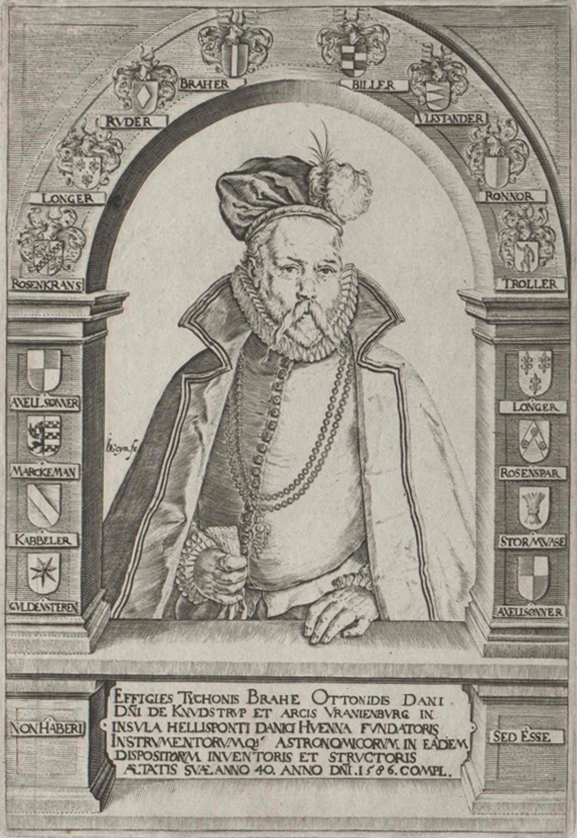
Beate, Judi’s 10x great aunt, had been a Lady-in-waiting to the Queen at Kronborg Castle at Helsingør, and this was the castle that Shakespeare used as the setting for his play Hamlet and called Elsinore’s castle. For a Shakespearian actor, like Judi, this is wonderful news. She pays a visit to Helsingør where the historian Dr Anne Sophie Refskou shows her a portrait of Tycho Brahe from 1584-1592 the period when William Shakespeare was writing plays in London. From the coats of arms around the astronomer’s portrait Judi finds out that Tyco was related to the Guildenstern and to the Rosencrantz families, names used by The Bard as characters in his play Hamlet. A line from Hamlet also turns out to be taken from Tycho’s motto. Judi naturally wonders if Shakespeare had come to Denmark, but it appears that in 1586 amongst the entertainers brought to the Royal Castle to perform were some touring players from England including one Will Kemp or Kempe. William Kempe (c. 1560–c. 1603) was connected to the Globe Theatre and so to Shakespeare and this could explain where the playwright obtained the names and ideas for the play that was, centuries later, to launch Judi in her first professional performance back in 1957.
Judi is thrilled that her research has led her back to Denmark and the connection to the castle used as the scene for Shakespeare’s play. She is also very proud of the Irish roots that she has uncovered in her episode of Who Do You Think You Are?
Using TheGenealogist.co.uk we were able to find Judi’s ancestors in a number of records. These included finding the Civil Birth Index record for Reginald Dench, Judi’s father. By using the 1939 Register on TheGenealogist we discover Judi’s parents in York in that year. The 1901 census of Hampshire found us Judi’s grandparents and their family before their move to Ireland. George Dench, Judi’s grandfather, is then recorded as a Manager of the British Homes Assurance Corporation in the Kelly’s Directory of Ireland 1905 and her father is recorded in the Army Lists as well as in the Medal Card that are found in the Military Records Collection. Judi’s Irish ancestors, Sir Richard and Sir Edward Bolton, were then found in the Rolls of Official Personages of the British Isles as well as in The Alumni Dublinenses 1593-1846 from TheGenealogist’s Educational Records, plus we discover the Boltons in the Index to Prerogative Wills of Ireland.
Sources:
Press Information from Multitude Media on behalf of the programme makers Wall to Wall Media Ltd
Extra research and record images from TheGenealogist.co.uk
BBC/Wall to Wall Ltd Images
Wikipedia Commons
https://picryl.com/media/brahe-tycho-8b5efc?






